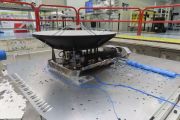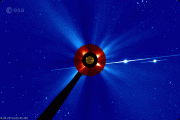
Copernical Team
Thin ice may have protected lake water on frozen Mars
 Small lakes on ancient Mars may have remained liquid for decades, even with average air temperatures well below freezing. Using a climate model adapted for Martian conditions, a team of researchers from Rice University discovered that lakes in locations such as Gale Crater, near Mars' equator, could have persisted under thin seasonal ice for at least decades and likely as long as climate conditi
Small lakes on ancient Mars may have remained liquid for decades, even with average air temperatures well below freezing. Using a climate model adapted for Martian conditions, a team of researchers from Rice University discovered that lakes in locations such as Gale Crater, near Mars' equator, could have persisted under thin seasonal ice for at least decades and likely as long as climate conditi Nullschool launches new mobile app for popular Earth weather platform
 Cameron Beccario, creator of the global weather visualization site earth.nullschool.net, has created a new company called Nullschool Technologies to support the platform's operation and development as a full-time focus. The one-person company is intended to keep the project small and flexible while adding structure to daily work, with the stated goal of making Earth's weather and climate visible
Cameron Beccario, creator of the global weather visualization site earth.nullschool.net, has created a new company called Nullschool Technologies to support the platform's operation and development as a full-time focus. The one-person company is intended to keep the project small and flexible while adding structure to daily work, with the stated goal of making Earth's weather and climate visible Cloud-9: a new celestial object found by Hubble

A team using the NASA/ESA Hubble Space Telescope has uncovered a new type of astronomical object – a starless, gas-rich, dark-matter cloud that is considered a 'relic' or remnant of early galaxy formation. Nicknamed 'Cloud-9,' this is the first confirmed detection of such an object in the Universe.
Tree planting for εpsilon
 Image:
Tree planting for εpsilon
Image:
Tree planting for εpsilon From roots to rocket

On 5 January 2026, the European Astronaut Centre (EAC) in Cologne, Germany, hosted a special tradition: the planting of an astronaut tree by ESA astronaut Sophie Adenot in honour of her first mission to space, εpsilon. This symbolic gesture celebrates her achievements and future mission while reinforcing the deep connection between space explorers and the planet they call home.
Space Rider orbital ballet
 Video:
00:01:47
Video:
00:01:47
Animation showing a possible interoperability application in orbit of payload deployment and retrieval operations with ESA’s reusable Space Rider.
Space Rider is a versatile uncrewed robotic laboratory about the size of two minivans. This video shows operations of how Space Rider could fly to an orbital platform and deliver payloads using a robotic arm as well as retrieving other payloads to return them to Earth. In the near future platforms orbiting Earth could allow for cheap and efficient experimentation and research in the low Earth-orbit economy. Whereas Space Rider could stay in orbit for two months, by delivering
Hunga eruption reshaped stratospheric water and ozone with limited climate cooling
 A new international assessment details how the January 2022 eruption of the Hunga Tonga-Hunga Haapai volcano in the South Pacific altered the stratosphere, atmospheric chemistry, and radiation while having only a small impact on global surface climate and the Antarctic ozone hole.
The Hunga Volcanic Eruption Atmospheric Impacts Report, released under the Atmospheric Processes and their Rol
A new international assessment details how the January 2022 eruption of the Hunga Tonga-Hunga Haapai volcano in the South Pacific altered the stratosphere, atmospheric chemistry, and radiation while having only a small impact on global surface climate and the Antarctic ozone hole.
The Hunga Volcanic Eruption Atmospheric Impacts Report, released under the Atmospheric Processes and their Rol Neural network sharpens satellite ocean color in complex coastal waters
 A recent study presents ACA-SIM, an atmospheric correction algorithm that uses satellite-in situ matchup data and neural networks to improve ocean color retrievals over coastal waters. The approach relies on real satellite radiance and in situ reflectance from Aerosol Robotic Network-Ocean Color (AERONET-OC) sites to reduce errors and striping artifacts in derived ocean color products, particula
A recent study presents ACA-SIM, an atmospheric correction algorithm that uses satellite-in situ matchup data and neural networks to improve ocean color retrievals over coastal waters. The approach relies on real satellite radiance and in situ reflectance from Aerosol Robotic Network-Ocean Color (AERONET-OC) sites to reduce errors and striping artifacts in derived ocean color products, particula OPERA satellite data sharpens US crop and water management
 OPERA the Observational Products for End-Users from Remote Sensing Analysis project was created in 2021 at NASAs Jet Propulsion Laboratory to supply federal agencies with satellite products that match their highest priority data needs as identified by the interagency Satellite Needs Working Group convened by the White House Office of Management and Budget and Office of Science and Technology Pol
OPERA the Observational Products for End-Users from Remote Sensing Analysis project was created in 2021 at NASAs Jet Propulsion Laboratory to supply federal agencies with satellite products that match their highest priority data needs as identified by the interagency Satellite Needs Working Group convened by the White House Office of Management and Budget and Office of Science and Technology Pol Alen Space begins SATMAR satellite validation over Bay of Algeciras
 Alen Space has completed the first demonstrator pilot campaign of VDES technology using its SATMAR satellite over the Bay of Algeciras in southern Spain. Over the past week, the company worked with Egatel and the Port Authority of the Bay of Algeciras to run several operational tests in a real maritime setting.
In the first pilot, SATMAR supported message exchanges between a vessel and the
Alen Space has completed the first demonstrator pilot campaign of VDES technology using its SATMAR satellite over the Bay of Algeciras in southern Spain. Over the past week, the company worked with Egatel and the Port Authority of the Bay of Algeciras to run several operational tests in a real maritime setting.
In the first pilot, SATMAR supported message exchanges between a vessel and the 



































